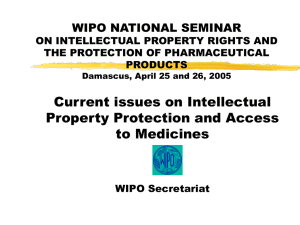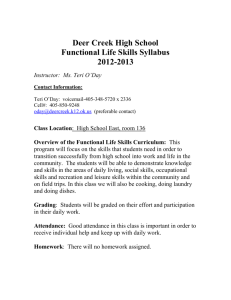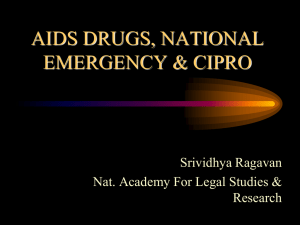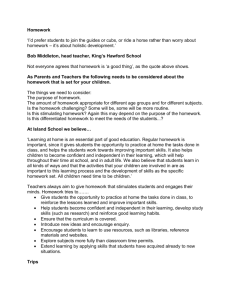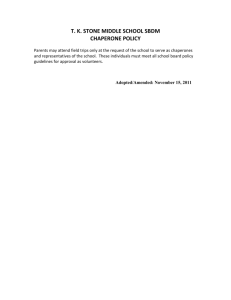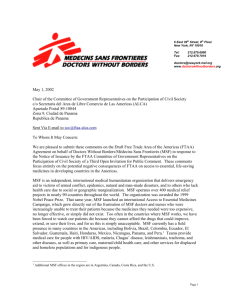preface - Third World Network
advertisement
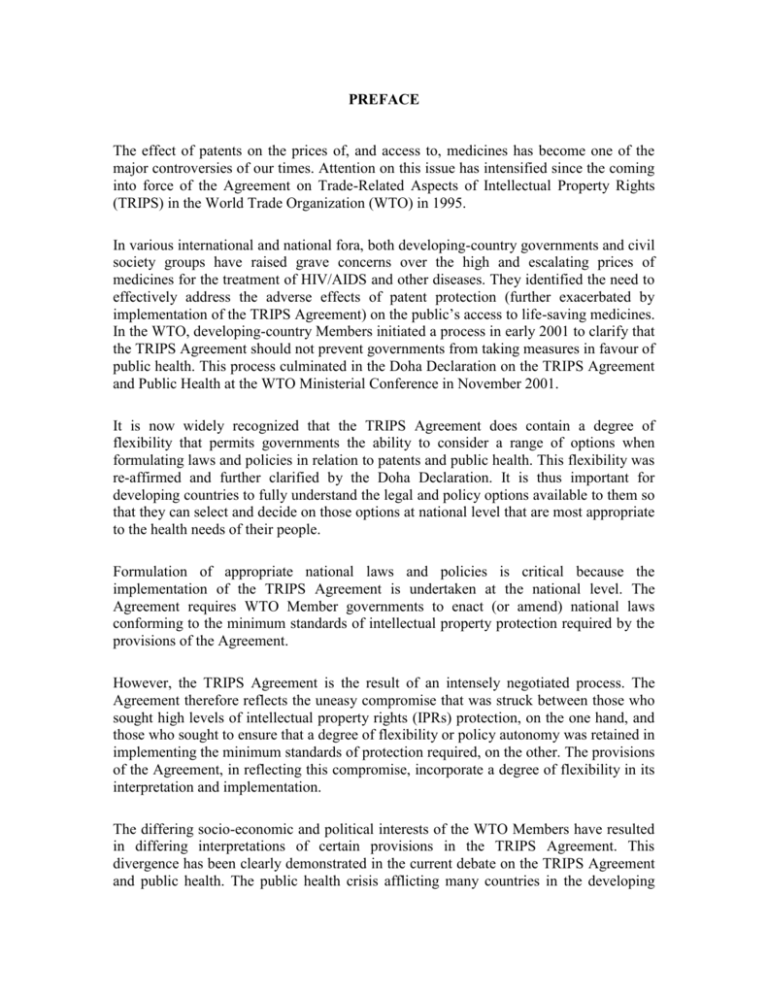
PREFACE The effect of patents on the prices of, and access to, medicines has become one of the major controversies of our times. Attention on this issue has intensified since the coming into force of the Agreement on Trade-Related Aspects of Intellectual Property Rights (TRIPS) in the World Trade Organization (WTO) in 1995. In various international and national fora, both developing-country governments and civil society groups have raised grave concerns over the high and escalating prices of medicines for the treatment of HIV/AIDS and other diseases. They identified the need to effectively address the adverse effects of patent protection (further exacerbated by implementation of the TRIPS Agreement) on the public’s access to life-saving medicines. In the WTO, developing-country Members initiated a process in early 2001 to clarify that the TRIPS Agreement should not prevent governments from taking measures in favour of public health. This process culminated in the Doha Declaration on the TRIPS Agreement and Public Health at the WTO Ministerial Conference in November 2001. It is now widely recognized that the TRIPS Agreement does contain a degree of flexibility that permits governments the ability to consider a range of options when formulating laws and policies in relation to patents and public health. This flexibility was re-affirmed and further clarified by the Doha Declaration. It is thus important for developing countries to fully understand the legal and policy options available to them so that they can select and decide on those options at national level that are most appropriate to the health needs of their people. Formulation of appropriate national laws and policies is critical because the implementation of the TRIPS Agreement is undertaken at the national level. The Agreement requires WTO Member governments to enact (or amend) national laws conforming to the minimum standards of intellectual property protection required by the provisions of the Agreement. However, the TRIPS Agreement is the result of an intensely negotiated process. The Agreement therefore reflects the uneasy compromise that was struck between those who sought high levels of intellectual property rights (IPRs) protection, on the one hand, and those who sought to ensure that a degree of flexibility or policy autonomy was retained in implementing the minimum standards of protection required, on the other. The provisions of the Agreement, in reflecting this compromise, incorporate a degree of flexibility in its interpretation and implementation. The differing socio-economic and political interests of the WTO Members have resulted in differing interpretations of certain provisions in the TRIPS Agreement. This divergence has been clearly demonstrated in the current debate on the TRIPS Agreement and public health. The public health crisis afflicting many countries in the developing world, particularly in sub-Saharan Africa, has fuelled this debate, focusing public attention on the manner in which intellectual property rights protection has an impact on areas of public policy making. In recent years, the pharmaceutical industry’s attempt (supported by certain developed countries) to block the enactment of TRIPS-compatible national law in South Africa (the pharmaceutical companies eventually withdrew their legal suit against the South African government in 2001), and the US-initiated complaint against Brazil in the WTO dispute settlement system over Brazil’s national law on compulsory licensing (the US withdrew the complaint in June 2001), are only two of the more prominent manifestations of the conflicts arising from differing interpretations of the TRIPS provisions. The Doha Declaration on the TRIPS Agreement and Public Health At the Fourth WTO Ministerial Conference at Doha (November 9-14, 2001), the WTO Members agreed to the unprecedented step of adopting a special Ministerial Declaration on issues related to the TRIPS Agreement and public health. The Doha Declaration on the TRIPS Agreement and Public Health can be said to be the first outcome of a longer process, to address the relationship between the TRIPS Agreement and public health. This process, initiated by the Africa Group of countries with active support from the majority of the developing countries in the WTO, saw the developing countries demanding a common understanding on the TRIPS Agreement. This common understanding was that the Agreement allowed the degree of flexibility necessary to meet public health objectives, particularly in relation to compulsory licences, parallel importation and exceptions to patent rights. This was thought necessary, not so much because the TRIPS Agreement lacked clarity but more because of the political obstacles that were put in their way as they attempted to put into effect the inherent flexibility of the TRIPS Agreement at the national level. The developing countries were moved to take this action in order to give effect to the conviction that the TRIPS Agreement and its provisions should not prevent WTO Members from adopting measures necessary to protect public health, including measures to ensure access to affordable medicines. The Doha Declaration thus represents a political victory for developing countries. It is a strong political statement which provides a degree of security for developing countries in adopting national-level measures necessary to meet public health objectives, against the fear of legal battles. However, the Declaration is only the first step. The real test of the success of the Declaration rests at the national level – whether or not developing countries will proceed to take the necessary measures at the national level so as to put into effect the flexibility that has been recognized in the Declaration. With this in mind, the Third World Network initiated a process to bring together a group of experts to discuss the issues and to develop a set of guidelines on national implementation involving appropriate patent laws and policy measures such as compulsory licensing and parallel importation. The Third World Network organized a series of workshops and consultations, involving experts on patent laws and multilateral trade rules, public health experts, senior diplomats and trade negotiators involved in the WTO negotiations on the issue, and representatives from civil society organizations. The aim was to produce a document that explains the issues involved, and the options available to developing countries in their process of formulating and developing the legal provisions and policy measures, in a manner that reflects the appropriate balance between the obligations under the TRIPS Agreement and the need to meet public health needs. This Manual is the result of that process. It is intended to be a contribution to the implementation of the political statement of the Doha Declaration. It seeks to spell out some of the policy and legal options available to developing countries in their consideration of the relationship between the TRIPS Agreement and public health issues. Organization of the Manual The Manual is organized into three main parts. Part I is a guide to TRIPS-consistent measures that can be taken to enable the import of and the local manufacture of affordable medicines. It also spells out the measures that can be taken for export of domestically manufactured medicines, taking into account the current state of the debate on the issue of exports within the WTO’s TRIPS Council. The aim is to provide a non-technical guide to the policy options available to developing countries in the development of national intellectual property regimes that are sensitive to public health needs. The guide should be read together with Part II of the Manual, which comprises model legal provisions. These model provisions provide the legal measures required to put into effect the policy options outlined in Part I. The model provisions in Part II are accompanied by explanatory notes which describe and explain the provisions. These include explanation and analysis of how the provision complies with the TRIPS Agreement. The model legal provisions provided in Part II are based on or adapted from existing legal provisions in national laws from around the world. The aim is to highlight state practice, adopted in both developed and developing countries, which is deemed TRIPSconsistent. There is a rich body of experience in the developed countries in particular, in the use of compulsory-licensing measures or government use of patents, which provides useful lessons. Therefore, in Part II, each model provision is accompanied by several examples of state practice on which the model provision is based. Part III provides suggestions on some key aspects of the institutional and administrative framework which is required for the effective implementation of public-health-sensitive patent laws. It is suggested that the framework should incorporate an administrative system for the implementation of compulsory licensing and government use of patents, based on fair and transparent decision-making processes, and clear and easy-to-apply guidelines. It is hoped that this Manual and the processes that led to it, and that will follow its publication, will be of practical contribution to policy makers and citizen groups in the worldwide endeavour to make medicines and health care accessible to all. S.M. Mohamed Idris, President Martin Khor, Director Cecilia Oh, Legal Advisor Third World Network May 2003
